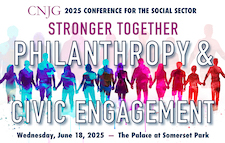Site Search
- resource provided by the Forum Network Knowledgebase.
Search Tip: Search with " " to find exact matches.
As we know, COVID-19 had a significant impact on student academic achievement. School districts across the state and country are working to accelerate student learning with a particular focus on literacy. Join us for our next Newark Education Funder meeting as we explore how funders can support a community approach to literacy, including the recently released Ten Point Literacy Plan. We will hone in on statewide and local data with the support of a recent study published by JerseyCAN, and then discuss how we can collaborate with grantees on systems that complement the traditional K-12 school day, particularly early literacy and support for reading at home, after-school and community programs, and collaborations with institutions like the Newark Public Library.
Panelists:
Paula White, Executive Director, JerseyCAN
Christian Zabriskie, Director, Newark Public Library
Nayibe Capellan, CEO, Programs for Parents
Catherine Wilson, President and CEO, United Way of Greater Newark
Cost: Free for CNJG Members; $50 for Non Member Grantmakers.
A CNJG member queried the corporate listserve on strategies or resources for virtual volunteering. CNJG compiled these responses, and listed the different opportunities that members are offering for employee volunteerism.

Date: Wednesday, June 18
Time: 8:00 a.m. to 4:00 p.m.
Location
The Palace at Somerset Park
333 Davidson Ave, Somerset, NJ
CNJG’s 2025 Conference for the Social Sector—Stronger Together: Philanthropy and Civic Engagement, features recognized thought leaders, national and regional experts, and community leaders for a full day of connection, shared exploration, thoughtful discussion, and side-by-side learning with philanthropic and nonprofit colleagues.
This year's conference will examine how funders and nonprofits can work together to address and increase civic engagement, focusing on several key areas, including advocacy, local media, participatory budgeting, guaranteed income, public-private partnerships, the arts, and youth education through the lens of civic participation.
Civic engagement is about more than voting or elections. As our colleagues at Philanthropy for Active Civic Engagement (PACE) define it:
“Civic engagement is the process of helping people be active participants in building and strengthening their communities, whether defined as a place or a shared identity or interest. It’s a spectrum of ways people can participate in self-governance, from interactions with government to voluntary associations, and everything in between.”
The opportunity for local communities to convene, learn together, and form partnerships can lead to meaningful action and increased public participation. Let’s explore how philanthropy can impact the social sector by buttressing these connections.
CNJG represents over 130 of NJ’s leading philanthropic organizations – foundations, corporations, and donors. Each year, we present a large-format meeting to include nonprofit partners to discuss big picture topics fostering learning and dialogue between funders and nonprofits.
| Agenda | |
| 8:00 - 9:00 am |
Registration/Breakfast/Networking/Resource Marketplace |
| 9:00 - 10:00 am | |
| 10:00 - 10:15 am |
Networking & Resource Marketplace |
| 10:15 - 11:30 am |
Morning Sessions: The Future of Civic Engagement |
| 11:30 - 11:45 am |
Networking & Resource Marketplace |
| 11:45 - 1:30 pm | |
| 1:30 - 1:45 pm |
Networking & Resource Marketplace |
| 1:45 - 3:00 pm |
Afternoon Sessions: Mobilizing New Jersey |
| 3:00 - 4:00 pm |
Ice Cream Reception/Networking/Resource Marketplace |
Conference Photos
Philanthropic organizations of all shapes and sizes are well positioned to support Communities for a Lifetime (CfaL). This issue brief explores four roles for philanthropy in advancing CfaL work.
At a recent Ocean & Monmouth Funders Roundtable, the group discussed all of the different databases and lists of nonprofits available to philanthropy to be able to research new and different nonprofits.

